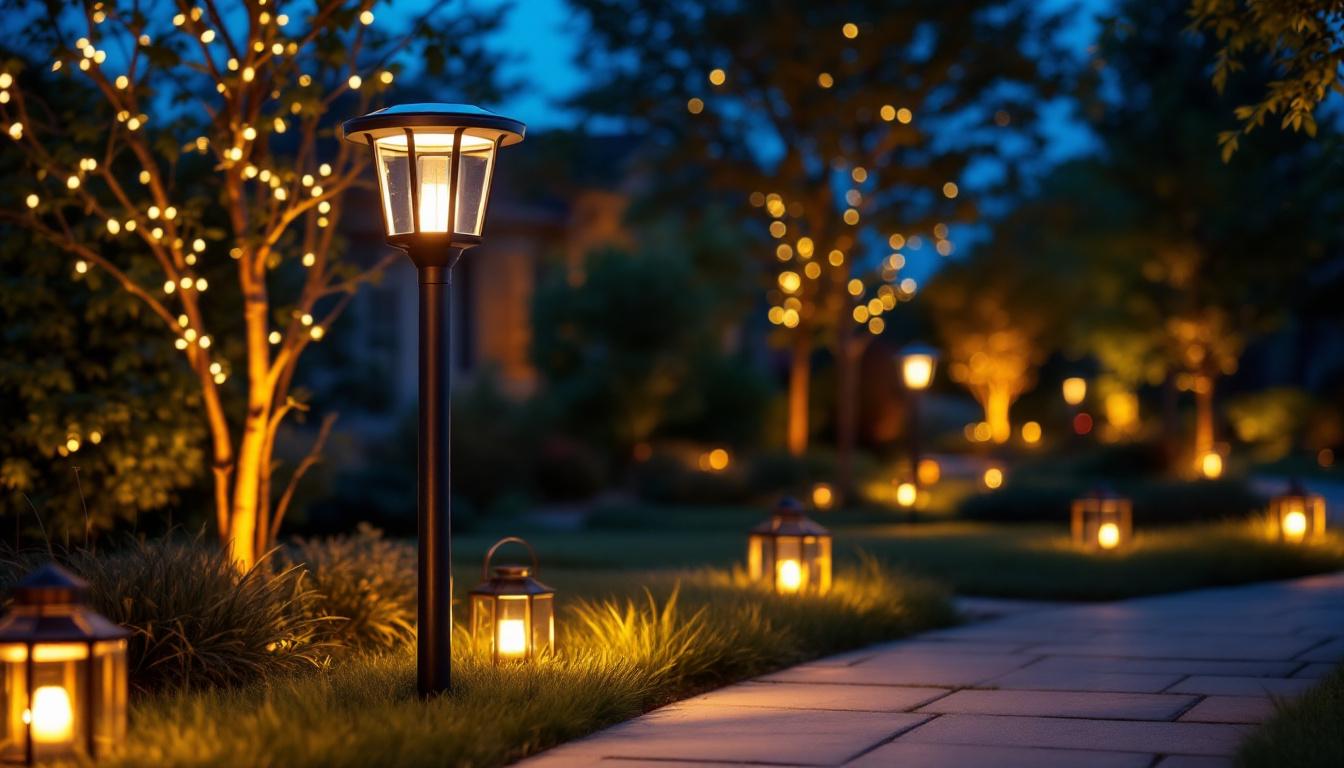
As the demand for sustainable and energy-efficient solutions continues to grow, outdoor solar lighting has emerged as a popular choice for both residential and commercial applications. Lighting contractors are increasingly faced with the decision of whether to recommend solar lights with posts or explore alternative options. Understanding the benefits and drawbacks of each can help contractors make informed choices that align with their clients’ needs.
This article delves into the advantages of outdoor solar lights with posts, compares them with traditional lighting alternatives, and provides insights into what lighting contractors should consider when making their recommendations.
One of the most significant advantages of outdoor solar lights with posts is their ability to harness renewable energy, which not only reduces electricity costs but also minimizes the carbon footprint associated with traditional lighting methods. These solar lights are equipped with photovoltaic cells that convert sunlight into energy, allowing them to operate independently without the need for wiring or electrical outlets. This feature makes installation straightforward and cost-effective, particularly in remote areas where access to power sources may be limited. Additionally, many modern solar lights come with advanced technology, such as motion sensors and adjustable brightness settings, enhancing their functionality and security features.
Moreover, outdoor solar lighting contributes to the aesthetic appeal of outdoor spaces. Available in a variety of styles and designs, solar lights with posts can complement the architectural features of a property while providing illumination for pathways, gardens, and patios. The soft glow emitted by these lights creates a welcoming ambiance, making outdoor areas more enjoyable for gatherings and events. Furthermore, as manufacturers continue to innovate, the durability and longevity of solar lights have improved significantly, with many products now designed to withstand harsh weather conditions, thus ensuring that they remain a viable option for long-term use.
One of the most significant advantages of outdoor solar lights is their energy efficiency. Solar lights harness sunlight during the day, converting it into energy stored in batteries for use at night. This means that once installed, they incur no ongoing electricity costs, making them an attractive option for budget-conscious clients.
Moreover, the initial investment in solar lighting can often be offset by these long-term savings. Clients appreciate the prospect of reduced energy bills, which can be particularly appealing for large properties or commercial spaces where lighting needs are extensive.
In an era where sustainability is paramount, solar lighting presents a green alternative to traditional electric lights. By utilizing renewable energy, solar lights contribute to a reduction in carbon emissions and reliance on fossil fuels. This aligns with the values of many clients who prioritize environmentally friendly solutions.
Furthermore, the installation of solar lights typically requires less invasive groundwork compared to wired alternatives, minimizing the environmental footprint during setup. This can be a compelling selling point for contractors looking to appeal to eco-conscious customers.
Outdoor solar lights are generally easier to install than traditional lighting systems. They do not require extensive wiring or electrical connections, which can save time and labor costs during installation. For contractors, this means quicker project completion and the ability to take on more jobs.
Maintenance is also simplified with solar lights. Most models are designed to be weather-resistant and durable, requiring minimal upkeep. Regular cleaning and occasional battery replacement are usually all that is needed, allowing contractors to provide clients with a low-maintenance lighting solution.
Traditional electric lighting remains a common choice for outdoor illumination. This option offers several advantages, particularly in areas where consistent lighting is essential. Electric lights can provide brighter illumination and are often more reliable during extended periods of cloudy weather or during winter months when sunlight is limited.
However, traditional lighting systems come with their own set of challenges. The need for electrical wiring can complicate installation, especially in established landscapes. Additionally, ongoing energy costs can add up over time, making this option less appealing for budget-conscious clients.
LED lights have gained popularity in recent years due to their energy efficiency and longevity. They consume significantly less power than traditional incandescent bulbs while providing bright, consistent illumination. For contractors, LED lights can be an excellent alternative to solar options, especially in settings where reliable lighting is crucial.
However, LED lights still require a power source, which means installation can involve more labor and materials than solar lights. Additionally, while LED technology has advanced, some clients may still prefer the aesthetic appeal of solar lights, particularly in garden settings.
Hybrid systems that combine solar and electric lighting are becoming increasingly popular. These systems can provide the best of both worlds, offering the energy independence of solar lights while ensuring reliable illumination during periods of low sunlight.
Contractors may find hybrid systems appealing for clients who want the sustainability of solar lighting without sacrificing performance. However, the complexity of installation and the initial investment can be higher, which may deter some clients.
When choosing between outdoor solar lights with posts and alternatives, it is crucial for contractors to consider the specific needs and preferences of their clients. Factors such as the intended use of the lighting, aesthetic preferences, and budget constraints can significantly influence the decision-making process.
For example, a client looking to illuminate a pathway may prioritize energy efficiency and low maintenance, making solar lights an ideal choice. Conversely, a client needing bright lighting for security purposes may lean towards traditional electric or LED options.
The site conditions and location play a vital role in determining the most suitable lighting solution. Areas with ample sunlight throughout the year are ideal for solar lights, while shaded or heavily wooded locations may require alternative options.
Additionally, local regulations and codes may impact the choice of lighting. Contractors should be knowledgeable about any restrictions or requirements that could influence their recommendations, ensuring compliance and client satisfaction.
Contractors should also consider the ease of installation and the level of support they can provide to clients after the installation is complete. Solar lights often offer a straightforward installation process, which can be a selling point for contractors looking to streamline their workflow.
However, providing long-term support, such as maintenance services or warranty options, can enhance the overall client experience. Contractors who can offer comprehensive support may find themselves more competitive in the market.
When evaluating the cost of outdoor solar lights with posts versus alternatives, it is essential to consider both initial investment and long-term expenses. Solar lights typically have a higher upfront cost due to the technology involved, but they offer significant savings over time through reduced energy bills and maintenance costs.
On the other hand, traditional electric lighting may have a lower initial cost, but ongoing energy expenses can accumulate, making it a more expensive option in the long run. Contractors should provide clients with a detailed cost analysis to help them make informed decisions based on their budget and preferences.
Performance is another critical factor to consider. Solar lights can be less reliable in areas with limited sunlight or during winter months, which may lead to inconsistent lighting. In contrast, traditional electric and LED lights provide a consistent and reliable source of illumination regardless of weather conditions.
Contractors should assess the specific lighting needs of their clients and the environmental conditions of the installation site to determine which option will deliver the best performance. A thorough understanding of the strengths and weaknesses of each lighting solution will enable contractors to make tailored recommendations.
Aesthetics play a significant role in outdoor lighting choices. Solar lights with posts often come in various designs and styles, allowing clients to choose options that complement their landscape and architecture. This flexibility can be a deciding factor for clients who prioritize the visual appeal of their outdoor spaces.
In contrast, traditional electric and LED lights may have a more utilitarian appearance, which may not align with the aesthetic goals of certain clients. Contractors should engage in discussions about design preferences and offer solutions that enhance the overall look and feel of the property.
In the evolving landscape of outdoor lighting, the choice between solar lights with posts and alternatives is not a one-size-fits-all decision. Lighting contractors must carefully evaluate the specific needs of their clients, the conditions of the installation site, and the long-term implications of each option.
Ultimately, the goal is to provide clients with a lighting solution that meets their functional requirements while aligning with their values and preferences. By staying informed about the latest advancements in lighting technology and understanding the pros and cons of various options, contractors can position themselves as trusted advisors in the field.
As the market for outdoor lighting continues to grow, embracing innovative solutions like solar lighting can not only enhance the contractor’s offerings but also contribute to a more sustainable future. By weighing the benefits and drawbacks of outdoor solar lights with posts against traditional alternatives, contractors can make informed choices that benefit both their clients and the environment.
Ready to elevate your outdoor lighting offerings and impress your clients with sustainable, high-performance solutions? Look no further than LumenWholesale for a comprehensive range of spec-grade lighting products. Our commitment to quality and affordability ensures that you can provide exceptional value to your clients without compromising on excellence. Embrace the future of lighting with our energy-efficient options, and enjoy the convenience of free shipping on bulk orders. Discover the ideal lighting for every project and make the smart choice for your business. Visit LumenWholesale today for wholesale lighting at the best value.

Discover how LED house light fixtures can transform your home’s ambiance and efficiency.

Discover the ultimate guide to overhead office lighting with insights from top lighting contractors.

Discover the art of mastering lighting with “Brightness 0,” a comprehensive guide for contractors.

Discover overlooked lighting fixture sale tips that lighting contractors often miss. Boost your projects with expert insights, saving up to 20%—learn more now!.